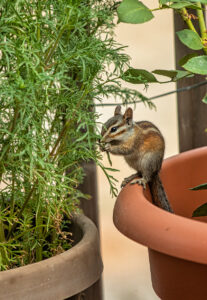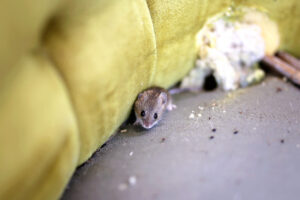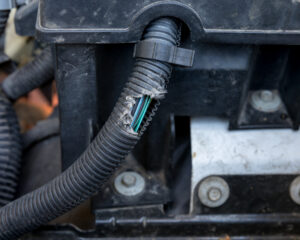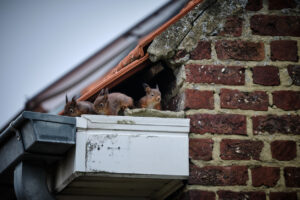Although some rodents may be intentionally welcomed into your home like your beloved hamster or a gerbil, many others are not. According to Britannica, rodents are the largest group of mammals with over 4,000 species. Given this sizable number, the presence of at least some of these rodents is likely to be found in your area. To prevent home invasions, landscape destruction or garden thievery, employing preventative measures to control rodent infestations should be done by a pest and wildlife control experts near you. In this guide, we’ll discuss frequently asked questions about rodent control in order to better help you protect your home and your loved ones.
What common animals may require rodent control?

While the sight of chipmunks scurrying up a tree trunk or a squirrel burying a nut may prompt moments of nature appreciation, gratitude is the last feeling that homeowners experience when these critters and other rodents turn their attention to homes, yards or gardens. Consequently, being aware of which rodents to look out for and understanding the potential problems that they may cause are vital for rodent control efforts. To help mitigate rodents and potential damage, the following highlights common rodents to watch for and where on your property they are most likely to do some damage:
Chipmunks
Though small and sprightly, chipmunks can be a menace with their burrowing, digging and gnawing. Outside, they will dig in gardens as well as under decks. Inside, chipmunks can be the reason that they and other pests enter your home or that electrical wiring or even structural components experience damage.
Squirrels
Both flying squirrels and other types of squirrels negatively impact homes and yards. Like chipmunks, they’ll eagerly dig up those flower bulbs you just planted, steal seeds and otherwise make a mess of bird feeders. If they find their way inside, their chewing, nesting and waste create myriad problems in the home, not to mention that just the sounds of squirrels in the attic may keep you from a restful night of sleep.
Mice
Equally as likely to take their teeth to wiring and insulation as to the delicacies in your pantry or pet food bowl, mice aren’t just a problem in rural locations. If you see one inside, you’ll either need to know how to catch a mouse or engage professional rodent control services in the event of a rodent infestation.
Rats
Rats and mice pose similar threats to a home’s interior; however, rats often do more damage in outside areas than mice. Have a project car in your garage? Rats can damage any part of that vehicle from its wiring to its engine to its upholstery. Do leverage the benefits of composting like reducing waste and supporting the health of your garden, as shared by the EPA? Rodent nesting can compromise this potential plant amendment or even entice them closer to gardens, where they can also damage plants.
Voles
While the previous rodents bring problems to both homes and yards, other rodents like voles primarily cause outdoor issues. Similar in appearance to mice, these pests tend to be most present in late winter and early spring, according to the University of Minnesota. They are notorious for doing root damage that results in unsightly lawns and plant failure.
Gopher
Like voles, gophers are an outside problem for property owners. Unlike their squirrel relatives that may be found rummaging in the attic, gophers spend the majority of their time underground but also wreak havoc on its surface. Consequently, the bumps in your lawn, weak areas or holes in the grass, and chewed trees, plants and utility lines may be the result of their handiwork.
Woodchuck
Especially in locations near wooded areas, the woodchuck or groundhog plagues homeowners who invest their time, energy and money into pristine lawns and stunning gardens. Despite being dormant for several months of the year, this larger rodent will destroy fruit trees as well as any flower or garden beds available, unless proper rodent control or preventative measures are taken.
Why may I be experiencing a rodent problem?

Needing rodent control isn’t necessarily a reflection of housekeeping, home improvement or landscaping skills. Although additional attention to these areas may help reduce the potential for rat infestations and other pest incursions, your property’s appeal may exist no matter how concerted the yard efforts or weekly cleaning routine. Understanding how the 3 following property features can attract mice and other rodents can help you with rodent monitoring and control efforts:
Food and water sources
From compost piles to tree nuts and berry bushes and trash cans to accessible food items in the pantry, rodents equally appreciate food sources that are naturally available and those that are curated by the homeowners themselves. Water features both inside and outside of the home also attract rodents. For example, leaky faucets or garden hoses as well as standing water in bird baths or underneath that problematic pipe in the basement can provide water that rats and other rodents need to survive.
Nesting locations
Why do squirrels choose attics or rats appreciate less frequented crawl spaces or sheds? These areas like piles of wood or leaves and thicker bushes offer a degree of safety from predators and the elements. Dark, quiet indoor locations also offer warmth as well as security. For example, squirrels and mice will happily nest in materials like paper, fabric or cushion stuffing. They may even make a home in an undisturbed piece of furniture or even a home’s walls. Consequently, without regular pest inspections and preventative care as well as rodent control if needed, a small population of pests may soon become a more substantial infestation.
Accessibility
Managing rodent access may be slightly more manageable for a home’s interior than it is for the lawn or garden beds on its exterior. Any homeowner who has watched a squirrel hop from a tree limb into the garden despite its protective fencing or found a rat in their closed garage well knows this kind of frustration. From broken screens and deteriorating door or window seals to cracks in the foundation or holes in the roof eaves, any entry points will be used by rodents who are looking to reap the benefits available in your home or garage. Outside, keeping garages and sheds shut, trash and compost contained and gardens fenced can help protect those locations. However, rodents in the area may still be able to dig up a garden bulb or otherwise snack on the first berries of the year.
Why should I be concerned about rodents?

Gophers, voles, chipmunks, squirrels and other rodents have the potential to be where you don’t want them. While their unexpected presence is certainly cause for concern, the damage that rodents can do to your home poses an even greater threat. Structural damage, electrical hazards and health dangers for humans and pets can stem from rodent infestations. Prevention strategies and rodent control help prevent the dangers below from being experienced by you, your loved ones or the buildings on your property:
Electrical system damage: In cars as well as buildings, rodents can chew or nest in wiring, which compromises equipment and home safety and operations. This scenario is particularly frightening since most wiring is difficult to access and therefore unlikely to be investigated on a regular basis. Therefore, people may be unaware of a potential problem until a fire occurs or a piece of equipment stops working because of it. Clearly, this rodent-related concern is not only a danger to the item itself but also to the people or pets who may be in its presence.
Contamination: Nibbling and nesting, eating and defecating, any number of daily rodent activities result in potential contamination. Damaged food items, unpleasant odors and unexpecting droppings in the pantry or elsewhere mean more than just additional cleaning or having to dispose of those items. According to the CDC, rodents pose a variety of health risks to any who may encounter them both through direct exposure to them or by contact with contaminated surfaces. In addition to their own lists of dangerous diseases such as Hantavirus, Leptospirosis and Salmonellosis, rats, chipmunks and other rodents can also carry ticks, fleas and other pests into the home. These bugs can further endanger human and pet inhabitants.
Structural interference: In addition to the wiring destruction that may lead to fire hazards, rodents like squirrels may chew on structural features like insulation, siding, wood or even water pipes. While the impact of this gnawing may initially look like regular wear and tear, it may eventually weaken these elements and result in flooding, increased energy bills or costly repair needs. Whether rodents are present inside or outside of the house, expensive fixes may be required to address their damage so that the potential for additional structural problems or even injuries and illness may be reduced.
How do I know if I need rodent control?

Routine inspections by reliable rodent control providers near you are the best way to assess the state of your property with regard to pest prevention strategies or immediate removal solutions. However, smart homeowners stay vigilant and conduct ongoing monitoring of the pests and wildlife on their property, especially in winter when infestations may be more likely. Keep a lookout for these signs of mice and other rodents that may indicate a need for rodent control:
- Presence of waste, such as related odors or the sight of fecal droppings, urine or smudges from body oil
- Shredded fabric like curtains and clothing or paper products including cardboard boxes and old bills
- Teeth marks in wiring, walls, furniture etc.
- Small holes in wood beams, cabinets or furniture
- Sounds including squeaking, scratching or rustling
- Pathways or signs of tunnels in the yard, as well as burrows, holes or weaker areas in the grass
- Nests made of insulation, paper, twigs or other materials which may be found anywhere from attics to bushes
- Chewed trees, shrubs, flowers, vegetables or herbs, including roots, stems, branches and fruits
- Uprooted plants or unusual soil mounds
- Damaged food packaging or garbage bags
- The sight of the actual rodent
What rodent control strategies can I use on my property?

Whether you’ve seen signs of rodents or want to prevent a rodent infestation, multiple rodent control strategies can be used to help reduce the potential for such a wildlife problem. Maximize the protection of your property by combining your own measures with the professional prevention recommendations and rodent control solutions of an experienced pest and wildlife removal specialist. Learn more about the expert services and home care strategies that can work together for comprehensive rodent control.
Professional pest control and extermination professionals like Eliminate ‘Em typically offer inspections and preventative maintenance, as well as removal services. Knowledgeable in these areas and experts regarding common rodents in your region, they can provide guidance and deliver the services you need to get rid of the squirrels in the attic or stop other rodents from making a home in your home, garage or shed. For example, an important strategy in deterring pests from your home is removing accessibility to it. Consequently, professional pest exclusion and abatement is a long-term rodent control strategy designed to block their entry. Eliminate ‘Em’s three-pronged approach addresses your home from underground through the first floor and into the attic and roof area. Homeowners can further support professional deterrent methods by fixing broken screens and door seals, as well as being more conscientious about keeping garage and shed doors closed.
Basement and attic cleanouts are additional rodent control interventions that can be undertaken by both homeowners and professionals. The rodent control experts may point out a leaky pipe while they seal up potential entry points around it or remove and sanitize old nesting locations and damaged insulation. However, homeowners can reduce the appeal of their attics and basements by fixing any water leaks, clearing out old fabric or paper items like old boxes or clothing donations and regularly inspecting those areas for signs of pests. Everyone in the family should also prioritize mindfulness around waste or compost collection, removal and containment, as well as food preparation and storage. For example, pet food or snacks shouldn’t be left out overnight, when rodents may be more likely to come out.
In addition to efforts inside the house, additional rodent control measures can be taken outside. Besides professional solutions specific to the rodent, consider using multiple different ways to repel animals from your garden, including planting vegetation that they don’t like, using hot pepper for more than your own culinary seasoning or switching to a covered compost container. While you may not be able to keep squirrels out of the garden entirely or avoid all potential plant problems (after all insects are a yard and garden problem too!), each strategy you employ helps lessen the likelihood of rodent damage and more significant infestations. Finally, set aside a regular time for yard clean up, including trimming shrubbery, removing piles of leaves and twigs or even adding protective fencing to flowers, fruit trees and plants.
When you need support with your home rodent control efforts or require immediate rodent removal solutions, Eliminate ‘Em can help. Available in service areas through the Northeast, our pest and wildlife specialists are available to provide both same-day and scheduled inspection, maintenance and removal services. Contact us today!


